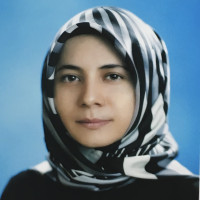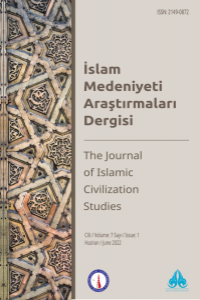ARTICLES
Issue Editorial Board


 0000-0003-4131-3532
0000-0003-4131-3532

 0000-0001-8475-339X
0000-0001-8475-339X

 0000-0001-8010-4173
0000-0001-8010-4173




 0000-0001-8208-3513
0000-0001-8208-3513
Aim & Scope
Journal of Islamic Civilization Studies aims to publish original research, evaluation (article, book, scientific meeting), review, compilation, statement, interview and critical style studies in fields such as theology, history, sociology, architecture, traditional arts, economics, political science, international relations, anthropology, literature within the scope of Islamic civilization and share them with the public.
In the Journal of Islamic Civilization Studies, original research, evaluation (article, book, scientific meeting), review, compilation, statement in the fields of Islamic civilization such as theology, history, sociology, architecture, traditional arts, economics, political science, international relations, anthropology, literature, Interview and edition critical style studies are published.
Author Guidelines
- İslam Medeniyeti Araştırmaları Dergisi’ne gönderilen Türkçe makalenin başında 150-250 kelimeden oluşan Türkçe Öz ve İngilizce Abstract, beş kelimelik Türkçe Anahtar Kelimeler ve İngilizce Keywords, Türkçe ve İngilizce başlığa yer verilmelidir.
- Diğer dillerde gönderilen makalelerin başında ilk önce yayın dilinde sonra Türkçe Öz ve Anahtar Kelimeler bulunmalıdır. Bu şartları yerine getirmeyen yazılar hakem sürecine alınmazlar.
- Yayınlanmak üzere dergimize gönderilen makaleler ÖN KONTROL, İNTİHAL TARAMASI, HAKEM DEĞERLENDİRMESİ ile TÜRKÇE-İNGİLİZCE DİL KONTROLÜ aşamalarından geçirilmektedir. Ön Kontrol aşamasında üç defa incelendiği halde bu süreçten geçemeyen çalışma, yazara iade edilmekte ve aynı yayın döneminde tekrar işleme alınmamaktadır. Ön Kontrol aşamasını geçen çalışmalar ise çift taraflı kör hakemlik ilkesi çerçevesinde en az iki hakemin görev aldığı değerlendirme sürecine alınmaktadır.
- Dergiye gönderilen yazılar, Microsoft Word programında yazılmalı ve sayfa yapıları aşağıdaki gibi düzenlenmelidir: Örnek makale şablonu için tıklayınız.
| Kağıt Boyutu | A4 Dikey |
| Üst Kenar Boşluk | 4 cm |
| Alt Kenar Boşluk | 3 cm |
| Sol Kenar Boşluk | 3 cm |
| Sağ Kenar Boşluk | 3 cm |
| Yazı Tipi | Times New Roman |
| Yazı Tipi Stili | Normal |
| Yazı ve Başlık Boyutu (normal metin) | 12 |
| Boyutu (dipnot metni) | 10 |
| Paragraf Aralığı | Önce 6 nk - Sonra 0 nk |
| Paragraf Girintisi | 1,25 cm |
| Satır Aralığı | 1,5 |
- Microsoft Word programında olmayan özel bir yazı tipi (font) kullanılmış yazılarda (Arapça fontlar dahil), kullanılan yazı tipi, çalışma sisteme eklenirken font dosyası da eklenmelidir.
- Yazılarda sayfa numarası, üst bilgi ve alt bilgi gibi ayrıntılara yer verilmemelidir.
- İslam Medeniyeti Araştırmaları Dergisi, atıf ve kaynakça yazımında İsnad Atıf Sistemi 2. Edisyonu (The Isnad Citation Style) kullanmaktadır. http://www.isnadsistemi.org/
Ethical Principles and Publication Policy
Publication Ethics Statement
The publication processes of the Journal of Islamic Civilization Studies are impartially and scientifically based on the production, development and sharing of information.
The peer-reviewed studies published by the Journal of Islamic Civilization Studies are studies that support scientific method and objectivity.
It is essential that all shareholders (authors, readers and researchers, publisher, referees and editors) involved in the publication process of the journal comply with ethical principles. In this respect, the publication ethics and open access policy of the Journal of Islamic Civilization Studies require all shareholders of the publication process to comply with ethical principles in line with the guidelines and policies (Code of Conduct and Best Practice Guidelines for Journal Editors” and “COPE Best Practice Guidelines for Journal Editors) published by the Committee on Publication Ethics (COPE) in open access.
In addition, the issues included in Council of Higher Education Scientific Research and Publication Ethics Instruction and Tubitak Research and Publication Ethics Board Regulation are the standards adopted by the journal.
The author(s) who prepared their works within the scope of the above ethical principles should not use fabricated data, manipulate the data, and should never allow plagiarism.
The work prepared for publication should not be repeating, published elsewhere or sent for publication.
If the author's work is an unpublished communiqué or produced from a master's or doctoral thesis, this must be stated on the first page.
Indicating that an "Informed Approval Form" has been received for studies that require ethics committee approval; for the use of scales, surveys, photographs belonging to others, permission from the owners should be obtained and stated, and it should be stated that copyright regulations are complied with for the intellectual and artistic works.
Publication Policy
a. Article Acceptance
Articles which sent to the Journal of Islamic Civilization Studies must be an original article that will fill a gap in the field or a review that evaluates a published studies and presents new and remarkable views on this subject.
Journal editors and editorial board have the authority to reject the articles that do not comply with the mentioned Publication Ethics rules and the publication policy of the journal.
The title of the article should be written in Turkish and English; the author’s names, surnames, academic titles, the institution they work for and their ORCID information should be stated. In addition, the contact information (e-mail addresses) of the authors should be given in full. The responsible writer should be a student in the articles written by master's and doctoral students together with their advisors.
The writing language of the Journal of Islamic Civilization Studies is Turkish. However, articles written in Arabic and English may also be included in each issue, not exceeding 1/3 of the journal. Arabic and English articles should contain Turkish titles and abstracts; Arabic texts are also required to include bibliography with the Latin Alphabet.
The research article should be between 3,000 and 10,000 words (except for the abstract, bibliography and appendix). It should include Turkish title, abstract (150-250 words), keywords (at least 5 concepts), English title, abstract (150-250 words), keywords (at least 5 concepts) and a bibliography prepared in the 2nd edition of the Isnad Citation System.
The article should be prepared in accordance with the journal writing rules and uploaded to the system.
An author can publish a single work at most in any number.
b. The Evaluation Process of Articles
Articles are subject to Pre-Control and Referee Evaluation processes.
Works are first reviewed by the Editorial Board for compliance with journal principles and checked for plagiarism. The maximum similarity rate is accepted as 15%. Studies that are accepted insufficient during the pre-control process are returned to the author by the Editorial Board without being included in the referee process. Studies that are accepted sufficient in the pre-control process are included in the referee process for evaluation or sent back to the author to finalize the deficiencies.
The work, which does not pass this process even though it has been examined three times during the Pre-Control process, is returned to the author and is not accepted again in the same publication period.
Studies that pass the Pre-Control process are included in the evaluation process in which at least two referees are assigned within the framework of the double-blind refereeing principle. The names of the referees are kept confidential. If one of the referee reports is positive and the other is negative, the manuscript can be sent to a third referee or the Editorial Board can review the referee reports and make the final decision. The authors consider the criticism and suggestions of the referee and the Editorial Board. If there are issues that they do not agree with, they have the right to object together with their reasons.
c. Article Acceptance Dates
Article acceptance dates are between 10 January - 30 April for the June issue; For the December issue, it is between 10 July and 30 October.
d. Citation and Reference System
The Journal of Islamic Civilization Studies requires the use of the Isnad Citation System 2nd edition in citation and bibliography.
e. Plagiarism Detection Policy
The articles are checked for plagiarism and it is confirmed that the articles have not been published before and do not contain plagiarism.
f. Publication and Evaluation Fee
Journal of Islamic Civilization Studies does not charge any fee from the authors for the article evaluation and publication process.
g. Copyright
The copyright of the articles accepted for publication is deemed to have been transferred to the Editor of the Journal of Islamic Civilization Studies within the limits specified in the copyright notice text.
Price Policy
Journal of Islamic Civilization Studies does not charge any fee from the authors for the article evaluation and publication process.



